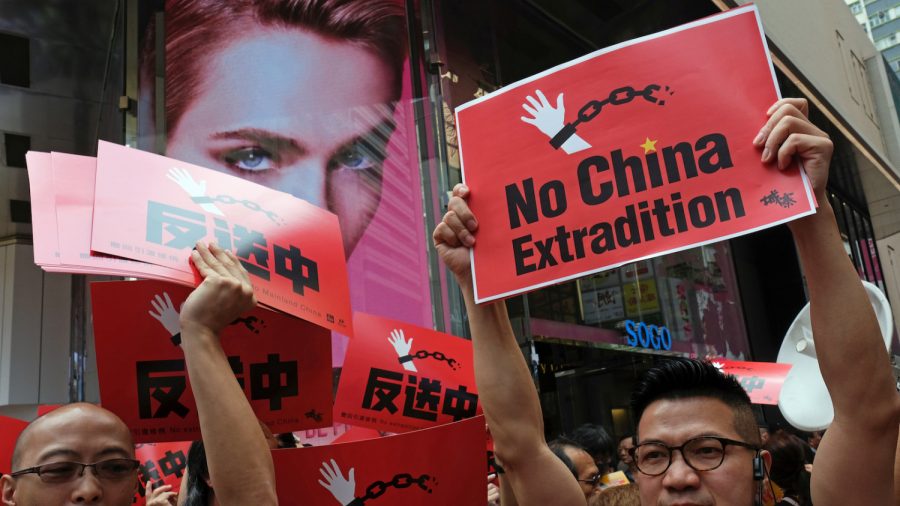U.S. lawmakers are joining a growing chorus of opposition to proposed changes in Hong Kong’s extradition laws that would allow fugitives to be sent to mainland China for criminal processing.
U.S. Rep. Christopher Smith (R-N.J.) said in an emailed statement to The Epoch Times that the proposed amendments should be withdrawn, as “they threaten the safety of anyone who dares to criticize or express opinions contrary to the Chinese Communist Government.”
He added that the “85,000 U.S. citizens living in Hong Kong, and U.S. journalists and businesses operating there have reason to be seriously concerned.”
Smith’s remarks come as more than 100,000 people took to the streets of Hong Kong on April 28 to protest the extradition amendments.
First announced in February, the changes would allow any nation, including China, to seek the extradition of individuals, as approved by the city’s chief executive, on a case-by-case basis.
Currently, Hong Kong has signed individual extradition agreements with 20 countries, including the United States, Canada, and the UK—but not China.
The laws have drawn opposition from a wide cross-section of society, including Hong Kong residents, business groups, and rights organizations, who say that, given the Chinese regime’s disregard for the rule of law, the amendments could allow Beijing to charge and extradite its critics with impunity.
Business groups added that the move would also jeopardize the city’s status as an international commercial hub.
The amendments are expected to be approved by Hong Kong’s legislature in the latter half of this year.
The proposed changes are the latest in a long line of developments that critics say have eroded the city’s independence and legal protections since Hong Kong reverted from British to Chinese rule in 1997, with the express guarantee that it would enjoy a high degree of autonomy and freedoms not allowed in mainland China—a policy known as “one country, two systems.”
Recent incidents include refusing to renew a visa for British national and Financial Times editor Victor Mallet, democracy activists being jailed, and opposition lawmakers being disqualified from public office.
U.S. Concerns
The U.S. State Department also raised concerns about the extradition proposals, given the “human rights violations and abuses carried out by China’s legal system, as well as general deterioration of respect for the rule of law,” it said in an April 25 statement.
The State Department added that it would closely monitor the situation in Hong Kong. “Societies are best served when diverse political views are respected and can be freely expressed. Continued erosion of the ‘one country, two systems’ framework puts at risk Hong Kong’s long-established special status in international affairs,” the statement read.
Earlier in April, U.S. Rep. James P. McGovern (D-Mass.) and U.S. Sen. Marco Rubio (R-Fla.) said in a joint statement that the planned amendments “will erode Hong Kong’s reputation as a center of commerce governed by the rule of law.”
“The people of Hong Kong and foreigners residing in Hong Kong—including 85,000 Americans—must be protected from a criminal justice system in mainland China that is regularly employed as a tool of repression,” the lawmakers said, adding that “the Chinese government has subjected both Chinese and foreign nationals to arbitrary detention, coerced confessions, denial of legal representation and medical treatment, and other types of mistreatment.”
U.S. House Speaker Nancy Pelosi (D-Calif.) also previously expressed deep concern about the amendments’ potential threat to the personal safety of Americans living in the city, the South China Morning Post reported in March.
Recently, a Hong Kong bookseller who was previously detained in China fled to Taiwan. He said he’s seeking refuge on the island because he is worried the amendments, if passed, would result in him being handed over to the Chinese regime.
“There’s a 99 percent chance that they would catch me and send me back to China. They [Chinese authorities] have already explicitly said that I’m a fugitive,” Lam Wing-kee told Reuters in Taipei.
Lam was detained in China in 2015 for working at a publishing company that printed books critical of Chinese communist leaders and their private lives.
Reuters contributed to this article.
From The Epoch Times


